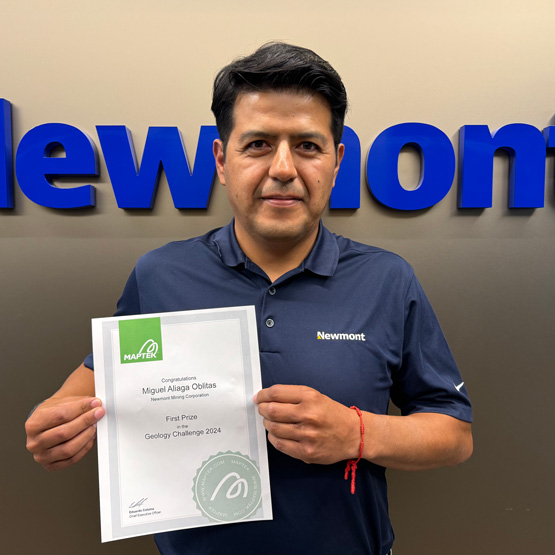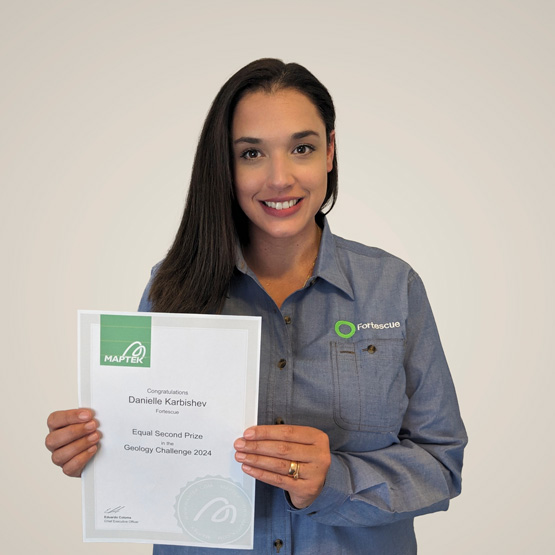December 2024 Issue Index
Solving challenging geology
A competitive field of entries saw a multivariable modelling study for an orogenic gold deposit win the Maptek Geology Challenge for 2024.
First prize in this year’s Maptek Geology Challenge has been awarded to Miguel Aliaga Oblitas who demonstrated how Maptek DomainMCF improved model consistency and reduced processing time in advanced multivariable geological modelling.
Senior Geomodeller with Newmont Mining Corporation, Oblitas received a personal prize of US$500 and a 6-month DomainMCF subscription for his company.
In his winning report, Oblitas defined the challenges of accurately predicting vein behaviour at depth, especially with limited data, and noted significant improvements in model accuracy and efficiency.

The reduction in processing time from weeks to just a few hours greatly facilitated model updates and timely decision making in exploration and resource estimation.
Oblitas noted the flexibility of the Domain Manager in Maptek GeologyCore, enabling the creation of custom rules and rapid testing of different structural scenarios, as key to overcoming the deposit complexity.
‘The integration of multivariable inputs, including lithological, vein intensity and mineralogical data, allowed for a more accurate and detailed representation of the deposit’s structural framework—something that was challenging to achieve with traditional methods,’ Oblitas commented.
Submissions displayed a range of modelling techniques and applications, and judging was tight, resulting in a tie for second place between Ed Lynch of SIMEC and Danielle Karbishev from Fortescue.
Resource Estimation Geologist, Karbishev trialled GeologyCore and DomainMCF to increase efficiency for the Fortescue resource modelling and estimation team and assess the potential applications of machine learning. Her biggest surprise was the ability of DomainMCF to rapidly generate grade estimations comparable to those produced via established estimation methods such as kriging.
‘Geological volume model outputs and grade predictions drastically improved with more detailed geological input data, however purely data-driven models can also be used to identify trends and structures prior to interpretation and domaining,’ Karbishev said.

‘More testing is required but it is clear that machine learning could revolutionise resource modelling and estimation as technology advances!’
The 3D drillhole visualisation options in GeologyCore proved particularly useful for validation of drillhole coding against modelled surfaces, as well as for stratigraphic domain interpretation using multi-element geochemistry and downhole geophysical data. The speed of DomainMCF in creating 3D block models allowed Karbishev to rapidly analyse vast databases and test alternate scenarios.
Superintendent Exploration Geologist, Ed Lynch was keen to apply DomainMCF to specific situations in the SIMEC haematite and magnetite operation, to test whether it could make things easier for geologists on site.
‘The complexity of the geological setting presents significant challenges to our geologists when it comes to 3D modelling and grade control,’ Lynch said.
‘DomainMCF was simple to use and incredibly fast. When given enough data it was able to produce similar results to more traditional human-driven modelling processes. It seems particularly suited to grade control type modelling scenarios,’ he concluded.

Now in its fourth year, the Challenge encourages experimentation and is transformative for resource modelling and production applications. The theme for 2024—geological control for geological models—saw participants combine their expertise with smart techniques to create accurate models directly from raw data.
Maptek provided GeologyCore and DomainMCF, as well as documentation and technical assistance. Entrants tackled problems that were difficult to solve with traditional methods. Their feedback for software improvements is being incorporated into our development roadmap.
- Miguel Aliaga Oblitas won the 2024 Maptek Geology Challenge, demonstrating how DomainMCF improved model consistency, reduced processing time and enhanced decision-making for complex gold deposits
- DomainMCF’s integration of multivariable inputs, flexibility for testing structural scenarios and speed in generating models proved revolutionary for resource estimation and modelling
- The challenge highlighted the potential to streamline geological modelling, improve grade control and support data-driven insights, showcasing advancements in machine learning

